[Don't miss your chance to get your copy of Rediscovery: Science Fiction by Women (1958-1963), some of the best science fiction of the Silver Age. If you like the Journey, you'll love this book (and you'll be helping us out, too!)

by Cora Buhlert
After a wet and cool summer, the rain continued right into September. We can only imagine what carpenter Armando Rodrigues de Sá thought when he arrived in rainy Cologne from sunny Portugal and became the one millionth so-called "guest worker", immigrant workers from Southern Europe contracted to work in West German factories to alleviate the labour shortage. In Cologne, Mr. Rodrigues de Sá was welcomed by journalists, cameras and a representative of the employers' association and presented with a flower bouquet and a motorbike.

Another visitor who received a warm welcome in Germany was American Civil Rights icon Dr. Martin Luther King Jr., when he visited Berlin earlier this month. The official reason for the visit was a memorial service for John F. Kennedy, but Dr. King also used the opportunity to visit the Berlin Wall, where only hours before a young man had been shot during an attempt to flee East Berlin and only survived due to the heroic actions of an US Army sergeant who pulled him to safety, a sad reminder that about fifty people have already been killed trying to surmount the Berlin Wall.

The East German government is hostile to religion, but supportive of the Civil Rights movement in the US. And so Dr. King was allowed to visit East Berlin, where he held a sermon in the packed Marienkirche and spontaneously intoned "Let My People Go". I'm not sure if the East German authorities got the message, but the people of East Berlin certainly did.
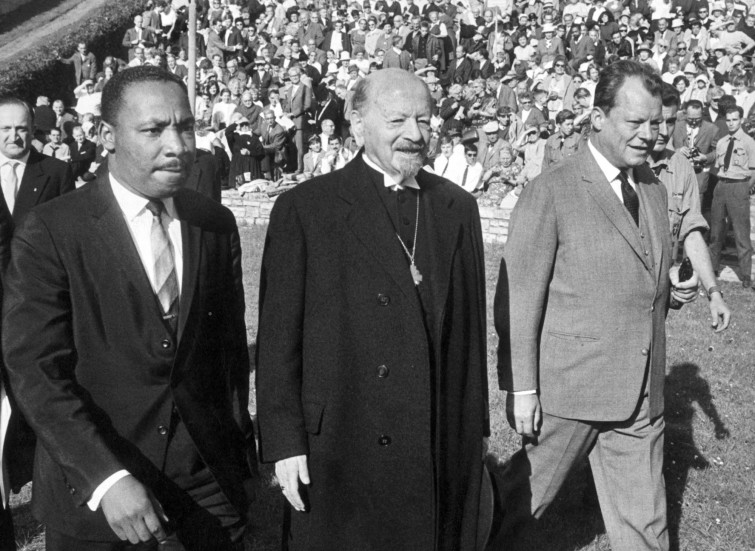
Rainy days are perfect for going to the movies and luckily, West German cinemas have plenty of thrills to offer. A few months ago, I introduced you to the two series of science fictional thrillers, which are currently dominating West German cinemas, namely the Edgar Wallace and the Dr. Mabuse series. Fans of both have reason to rejoice, because this fall has brought us both a new Edgar Wallace and a new Dr. Mabuse film.
A New High for Edgar Wallace
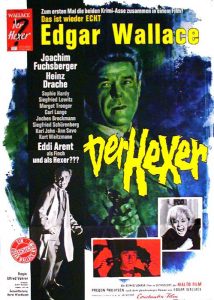 Der Hexer (The Ringer) is the twentieth Edgar Wallace adaptation produced by Rialto Film and one of the best, if not the best movie in the series so far. The Ringer is a pure delight and a distillation of everything that has made the Edgar Wallace series so successful. The balance of humour and thrills is just right and The Ringer will have you both rolling on the floor with laughter and on the edge of your seat with suspense. There are nefarious crimes, a mysterious figure – for once not the villain – whose true identity is not revealed until the final reel and a twisting and turning plot that still has a twist or two in store, even after the Ringer has been unmasked.
Der Hexer (The Ringer) is the twentieth Edgar Wallace adaptation produced by Rialto Film and one of the best, if not the best movie in the series so far. The Ringer is a pure delight and a distillation of everything that has made the Edgar Wallace series so successful. The balance of humour and thrills is just right and The Ringer will have you both rolling on the floor with laughter and on the edge of your seat with suspense. There are nefarious crimes, a mysterious figure – for once not the villain – whose true identity is not revealed until the final reel and a twisting and turning plot that still has a twist or two in store, even after the Ringer has been unmasked.
 The Ringer is based on Edgar Wallace's 1925 novel The Gaunt Stranger and its 1926 stage version The Ringer, though the literal translation of the German title would be "The Witcher". It's certainly apt, for the titular character is not just a master of disguise, but also has nigh sorcerous abilities to evade Scotland Yard's finest.
The Ringer is based on Edgar Wallace's 1925 novel The Gaunt Stranger and its 1926 stage version The Ringer, though the literal translation of the German title would be "The Witcher". It's certainly apt, for the titular character is not just a master of disguise, but also has nigh sorcerous abilities to evade Scotland Yard's finest.
Apprehending an antagonist is cunning as the Ringer certainly requires the best Scotland Yard has to offer and so The Ringer is the first film to unite the three actors who usually play inspectors in the Edgar Wallace movies, namely the young and dashing Joachim Fuchsberger and Heinz Drache and the older and decidedly not dashing Siegfried Lowitz. They are aided – or hindered, depending on your point of view – by Wallace veteran Siegfried Schürenberg in his customary role as Sir John Walker, head of Scotland Yard.
Like most Edgar Wallace movies, The Ringer begins with a murder before the title sequence. A young secretary is spying on her boss, dodgy lawyer Maurice Messer (Jochen Brockmann), when she is strangled by an unseen assailant. The movie then cuts to her dead eyes staring at us from the glass dome of a mini-submarine that slowly dives into an underground pool. Cue the titles and Peter Thomas' delightfully squeaky theme music.
That Ain't Witchcraft
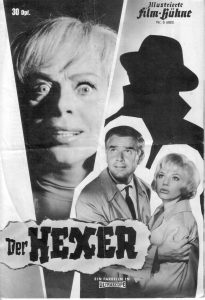 Unbeknownst to the killers, the murdered woman was Gwenda Milton, the younger sister of Arthur Milton, the vigilante known only as the Ringer for his uncanny ability to disguise himself as anybody he pleases. Years ago, Arthur Milton had given up his career of vigilantism and retired to Australia, far beyond the reach of the British law. But now he is back to take revenge on the murderers of his sister. Of course, both the villains and Scotland Yard are only too eager to capture the Ringer. There is only one problem. No one knows what he looks like.
Unbeknownst to the killers, the murdered woman was Gwenda Milton, the younger sister of Arthur Milton, the vigilante known only as the Ringer for his uncanny ability to disguise himself as anybody he pleases. Years ago, Arthur Milton had given up his career of vigilantism and retired to Australia, far beyond the reach of the British law. But now he is back to take revenge on the murderers of his sister. Of course, both the villains and Scotland Yard are only too eager to capture the Ringer. There is only one problem. No one knows what he looks like.
What follows is a merry chase, as the Ringer pits the villains, four pillars of society who operate a human trafficking ring out of a church-run home for wayward girls, against each other, while three police inspectors and Sir John fall over each other's feet to arrest him. Also along for the ride are Archibald Finch (Edgar Wallace stalwart Eddi Arent), a reformed pickpocket (or is he?) turned butler, and Cora Ann Milton (Margot Trooger), the Ringer's glamorous and loyal wife. The result is so much fun that you barely notice that the plot doesn't make a whole lot of sense (but then, Edgar Wallace movies often don't) and that occasionally the Ringer has to move things forward by handing either Scotland Yard or the villains a clue – literally on a silver platter in one case.
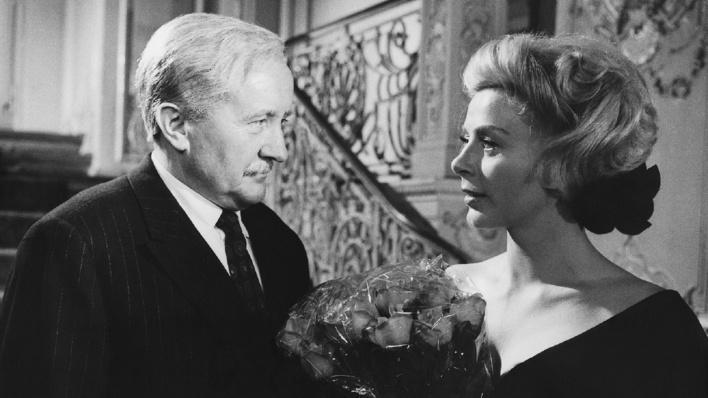
Women in Edgar Wallace movies usually come in one of two flavours, the wide-eyed ingenue who will go on to marry the dashing inspector after he has saved her from certain death and the villainous femme fatale who will usually end up dead, after vamping her way through the movie. The Ringer breaks this pattern, for while Margot Trooger as Cora Ann takes the part of the femme fatale, she is neither a villainess nor does she die. Cora Ann is not a henchwoman, but a true partner to her husband and also very much in love with him. She is my favourite female character in the Edgar Wallace series so far. The ending leaves open the possibility of a sequel and I for one would love to see the continuing crime fighting adventures of Arthur and Cora Ann Milton.
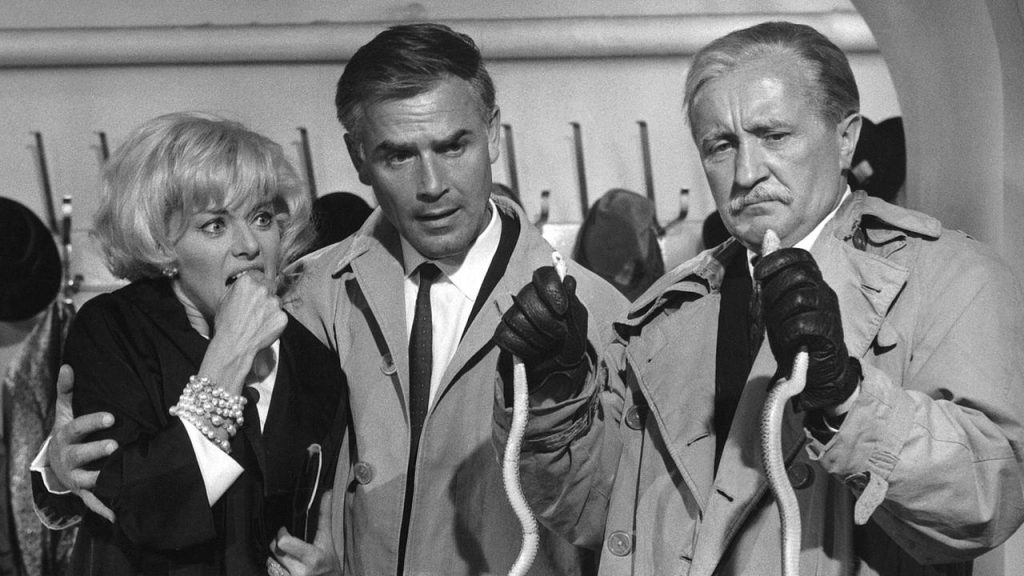
The heroine is played by French actress Sophie Hardy as Elise Fenton, the girlfriend of Inspector Higgins (Joachim Fuchsberger). Elise is no wide-eyed ingenue either – indeed it is quite openly hinted that she and Higgins are living together, even though they are not (yet) married. Elise probably seemed modern and liberated on paper. Alas, she comes across as annoying in the movie itself, a nagging, jealous and catty woman whose only goal in life seems to be to entrap Higgins (or "Higgy", as she calls him) into marriage. Maybe Karin Dor could have given the character more depth – alas, she was too busy playing Winnetou's true love Ribanna in Horst Wendlandt's other hugely successful film series. As it is, I found myself hoping that Higgins would ditch the annoying Elise for Sir John's attractive secretary Jean (Finnish actress Ann Savo).
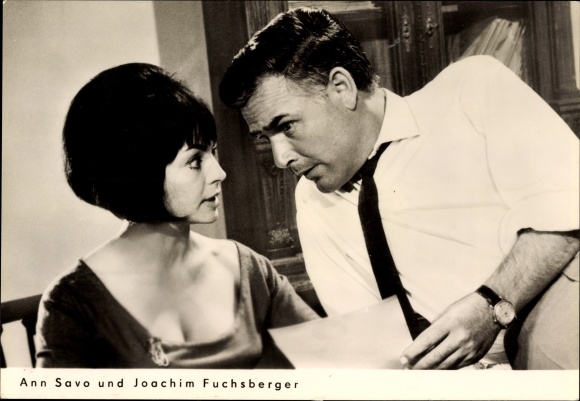
The Ringer Unmasked
While the romance subplot isn't quite successful, the movie excels in keeping the audience guessing the identity of the Ringer. The script steers suspicion towards two characters, the mysterious Australian James Westby (Heinz Drache) and pickpocket turned butler Archibald Finch (Eddi Arent), who always seems to know much more than he should. To anybody who's been watching the Edgar Wallace movies for a while, both suspects seem equally unlikely, for Heinz Drache usually plays heroic inspectors, while Eddi Arent inevitably plays bumbling comic relief characters. However, the Wallace movies are not afraid to cast against type on occasion: the heroic investigator is revealed to be the villain in The Red Circle (1959) and in Feburary's Room 13, the wide-eyed ingenue turned out to be a cold-blooded murderess.
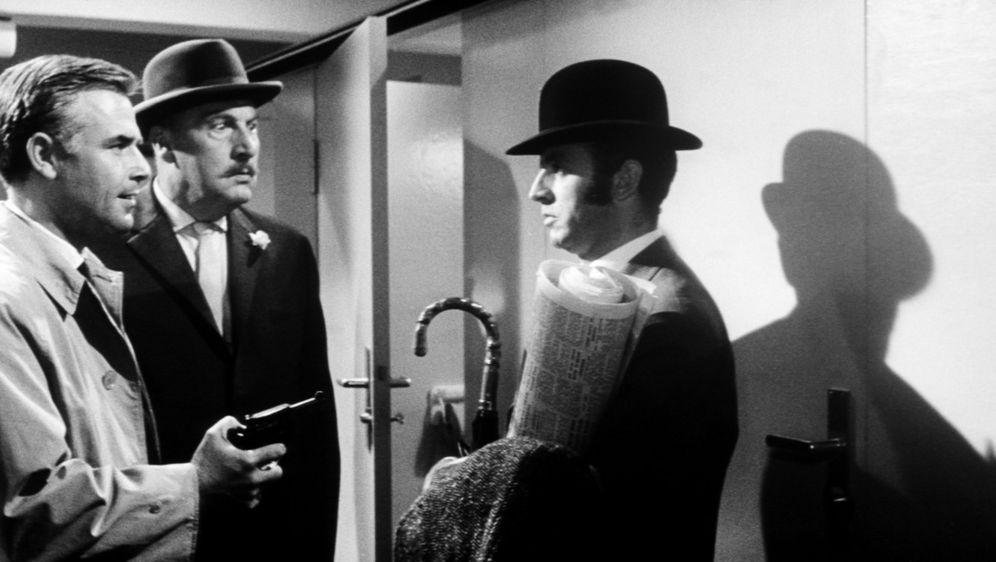
In the end, the Ringer is revealed to be a character no one ever suspected, even though the rest of the cast and the audience have no reason to believe or trust him. It’s a testament to the cleverness of the story that we don’t even notice this until the final unmasking. And indeed, producer Horst Wendlandt and director Alfred Vohrer went to great lengths to keep the true identity of the Ringer secret even from the cast and crew. The final few pages of the script were locked away in Wendlandt's safe to prevent leaks. When the Ringer is finally unmasked, the face behind the latex mask is that of Luxembourgian actor René Deltgen. Portly, balding and fifty-four years old, Deltgen is no one's idea of a criminal mastermind and dashing vigilante, but then the entire movie defies expectations and shows that the Edgar Wallace series still hasn't gone stale after twenty instalments.
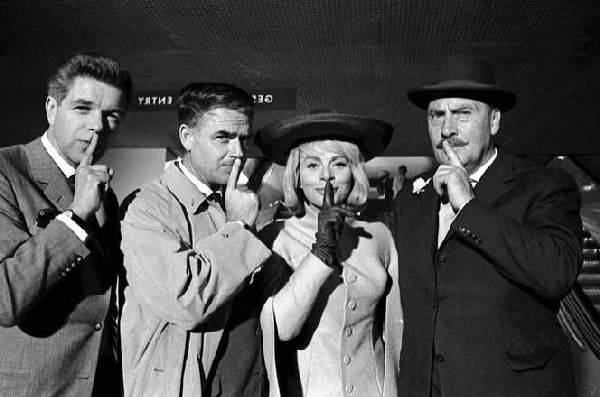
Dr. Mabuse Returns – Again
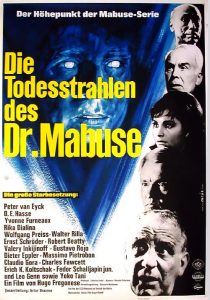 Unfortunately, the same cannot be said for the latest movie in the other great West German thriller series. For while the Dr. Mabuse series has been very good at reinventing itself in the five movies made post WWII (plus two made during the Weimar Republic) so far, the latest instalment Die Todesstrahlen des Dr. Mabuse (The Death Ray of Dr. Mabuse) shows definite signs of the series going stale.
Unfortunately, the same cannot be said for the latest movie in the other great West German thriller series. For while the Dr. Mabuse series has been very good at reinventing itself in the five movies made post WWII (plus two made during the Weimar Republic) so far, the latest instalment Die Todesstrahlen des Dr. Mabuse (The Death Ray of Dr. Mabuse) shows definite signs of the series going stale.
When we last saw Mabuse in 1963's Scotland Yard vs. Dr. Mabuse, he had not only failed to establish a reign of crime and chaos in the UK, but his malevolent spirit had also vacated the body of psychiatrist Professor Pohland (Walter Rilla), leaving the poor man uttering "It wasn't me, it was Mabuse. He used my brain" over and over again. Pohland was locked up in an insane asylum, because that worked so wonderfully when Mabuse was apprehended in The Testament of Dr. Mabuse – twice. The opening of The Death Ray of Dr. Mabuse finds Pohland still in the asylum and still muttering the same lines over and over again. When the British send intelligence officer Major Bob Anders (Peter van Eyck) to interrogate Pohland, Pohland utters the word "death ray" and promptly vanishes. This is the third time German-American actor Peter van Eyck takes the lead in a Mabuse movie after The 1000 Eyes of Dr. Mabuse and Scotland Yard vs. Dr. Mabuse. All three characters have different names, though Major Bill Tern from Scotland Yard and Major Bob Anders from Death Ray are so similar they might as well be the same character.
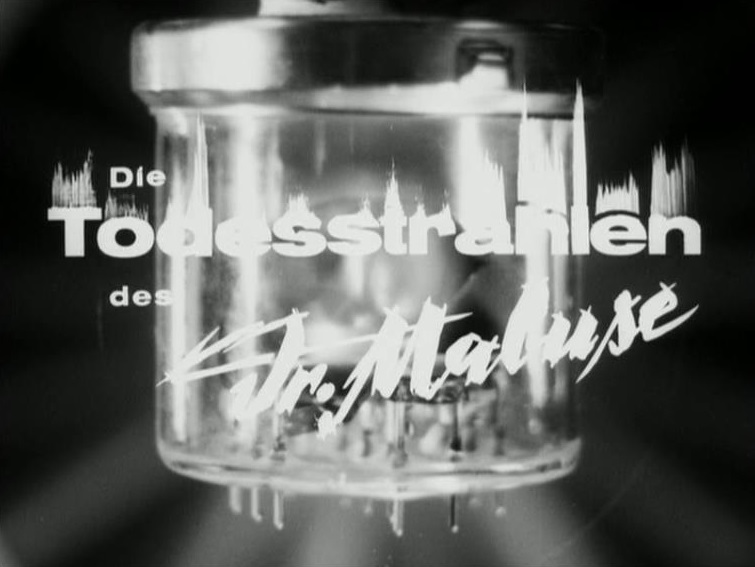
A Game of Spies
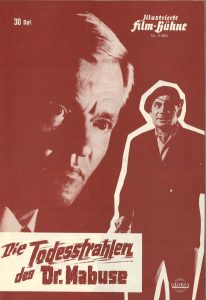 Not long after Pohland's disappearance, Anders is given a new assignment – to investigate spy activities in Malta, where a scientist named Professor Larsen is working on an invention that will change the world. And that invention just happens to be a death ray. Anders no more thinks that this is a coincidence than the audience does. So he hastens to Malta, taking along Judy (former Miss Greece Rika Dialina), one of his many girlfriends, to pose as a newlywed couple on their honeymoon.
Not long after Pohland's disappearance, Anders is given a new assignment – to investigate spy activities in Malta, where a scientist named Professor Larsen is working on an invention that will change the world. And that invention just happens to be a death ray. Anders no more thinks that this is a coincidence than the audience does. So he hastens to Malta, taking along Judy (former Miss Greece Rika Dialina), one of his many girlfriends, to pose as a newlywed couple on their honeymoon.
Since everybody in Malta knows who Anders is anyway, the ruse is completely unnecessary. And indeed, I wish that the movie had omitted Judy, who adds nothing to the plot except prancing about in bikinis and scanty nightwear and moaning that Anders isn't paying enough attention to her. Because if Elise from The Ringer was annoying, Judy is certainly giving her a run for her money. As with Elise, Judy's sole aim in life seems to be to entrap Anders into marriage. I really hope that the appearance of two similarly grating female characters in two high profile West German movies in the space of less than a month is just a coincidence and not a new trend. After all, it's 1964 and young women these days are focussed on more than just snagging a husband.

In Malta, we are quickly introduced to the rest of the players, Professor Larsen (O.E. Hasse), his assistant Dr. Krishna (Valéry Inkijinoff), Larsen's niece Gilda (Yvonne Furneaux), Gilda's fiancé Mario Monta (Gustava Rojo), whose brother Jason (Massimo Pietrobon) owns the local fishing fleet and may be working for Mabuse as well as Fausto Botani (Claudio Gora), an elderly man who always tends to the grave of his late wife in a cemetery that is a hotbed of suspicious activities. We also get a techno-babble laden introduction to Professor Larsen's death ray projector, which can burn every city on Earth to a crisp.
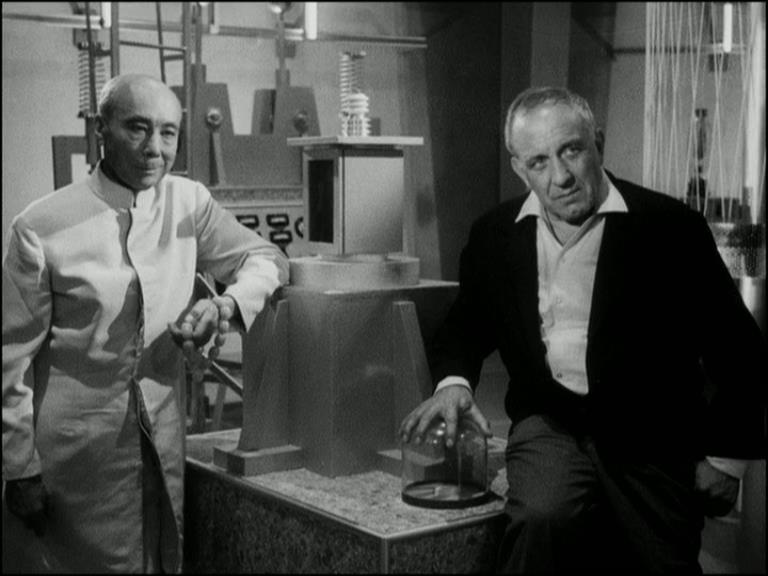
The bulk of the movie is a succession of action sequences, as Mabuse and his henchmen try to infiltrate Professor Larsen's laboratory, while Anders tries to stop them. And indeed the action sequences, whether it's a fist fight in a church tower, a car chase or an underwater fight involving several scuba divers, are exciting and well choreographed. Director Hugo Fregonese is best known for helming B-westerns in Hollywood and his experience certainly shows.
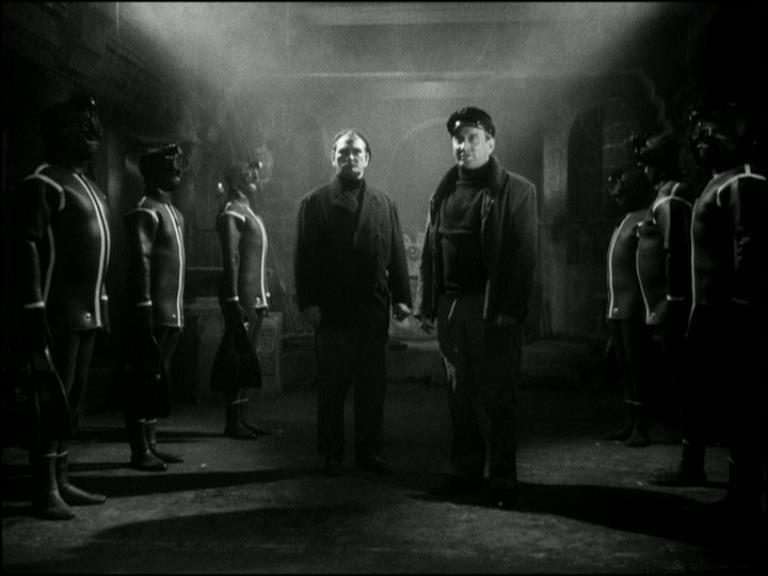
Regarding the identity of Mabuse, the script directs suspicion at Larsen's assistant Dr. Krishna, playing on unpleasant yellow peril stereotypes. In the end, however, the seemingly harmless Fausto Botani is unmasked as Mabuse's latest host body, just in time for Mabuse's spirit to leave and seek his fortune elsewhere. In one of the most chilling sequences of the film, Botani is left to mutter "It wasn't me, it was Mabuse. He used my brain" over and over again, while his faithful dog Pluto – implied to be the same German shepherd that already accompanied Wolfgang Preiss as Mabuse in The 1000 Eyes of Dr. Mabuse – runs off, presumably to seek out his master's next host body.
Mabuse goes Bond
The greatest strength of the Dr. Mabuse series is its versatility. Mabuse's nature as a body-hopping malevolent spirit allows producer Artur Brauner to plug the character into any kind of scenario. And so Mabuse's postwar adventures have ranged from exploring Cold War paranoia and economic fears via offbeat gangster films and science fiction horror movies to a Mabuse film pretending to be an Edgar Wallace movie. With this latest movie, Dr. Mabuse tries out yet another genre, namely that of the James Bond influenced spy thriller.
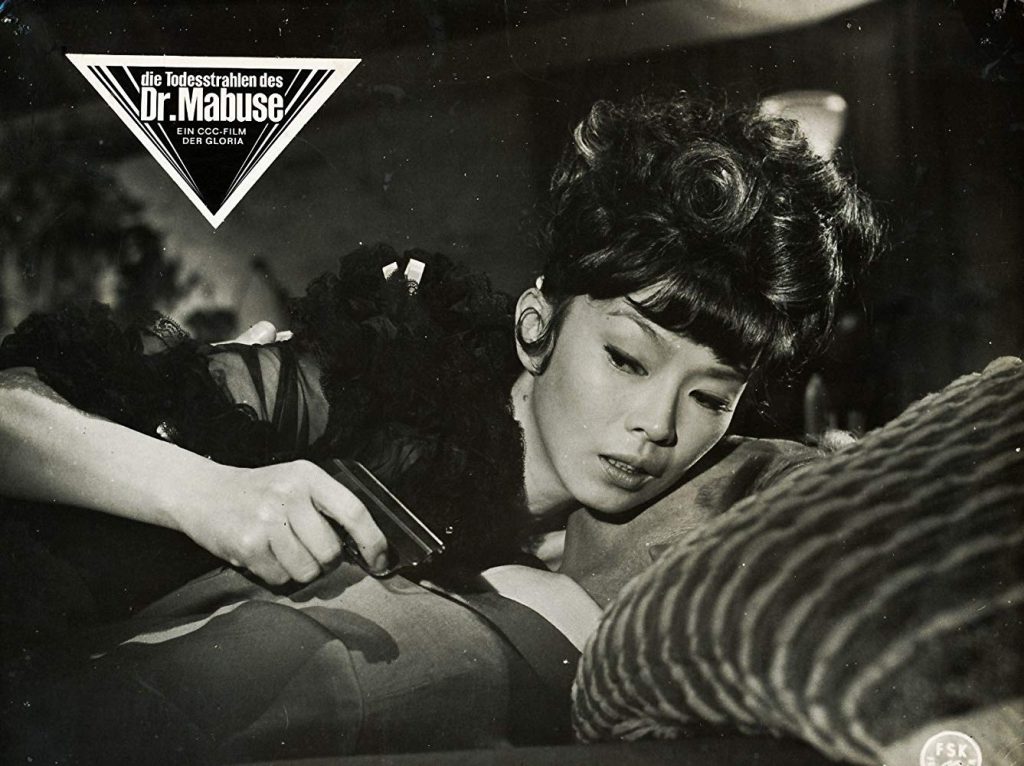
The James Bond movies – the most recent one of which, Goldfinger, premiered in the UK on the same day as The Death Ray of Dr. Mabuse, though West German audiences won't get to see it until January – are enormously popular in Europe. Exotic locations, pulpy adventure and outlandish villains are a large part of the appeal of the Bond movies and since these ingredients can also be found in the Mabuse series, Mabuse and Bond should be a match made in heaven. And while Peter Van Eyck is no Sean Connery and a little old for an action hero (fifty-one compared to Connery's thirty-four), he certainly has the required charm and square-jawed handsomeness to play a Bond stand-in.
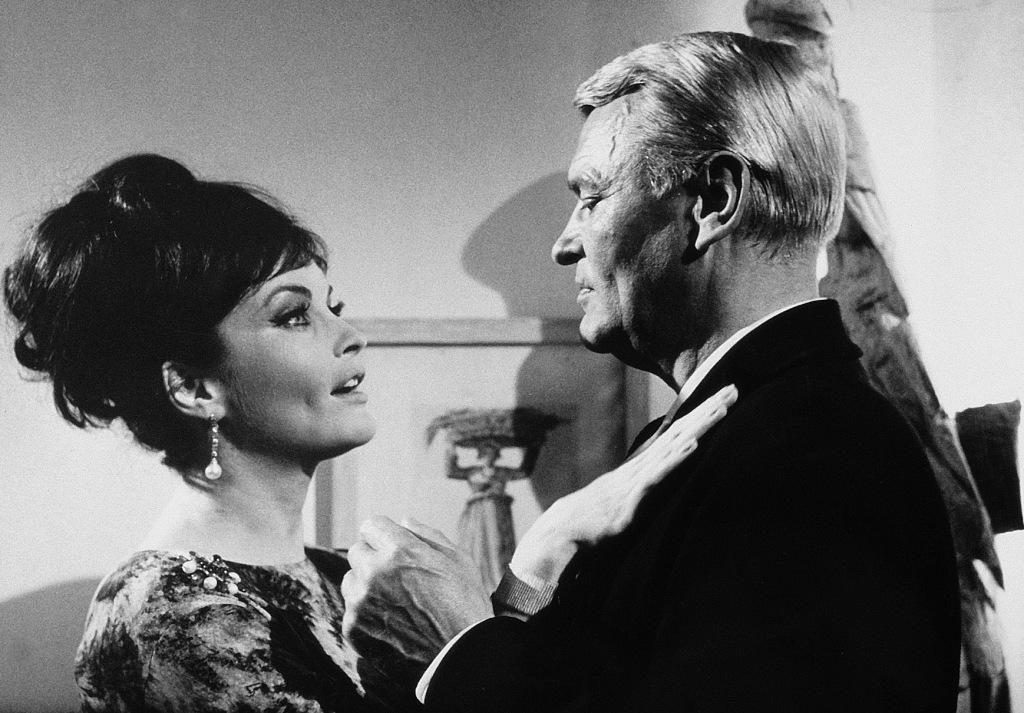
There is only one problem. The Death Ray of Dr. Mabuse just doesn't work, neither as a Mabuse movie nor as a Bond look-alike. The main issue here is that the James Bond movies present their exotic locations and beautiful women in full Technicolor glory, while the Mabuse films have always worked best when imitating the atmospheric black and white look of the expressionist cinema of the Weimar Republic which gave birth to the character. Mabuse thrives in the shadows, but Death Ray drags him into the bright Mediterranean sunshine. As a result, the exterior scenes feel overlit and washed out, while the extensive underwater scenes seem blurry and murky. I have no doubt that the coast of Malta – or rather the coast of Italy standing in for the coast of Malta – is beautiful, but in this movie it is just grey.
Would Death Ray have worked better, if it had been shot in colour? I suspect we'll never know. However, I'm not the only one who is dissatisfied with the movie, since the box office performance of Death Ray has been underwhelming so far. Opening against Winnetou II, one of the most highly anticipated movies of the year, didn't help either.
So what's next for Dr. Mabuse? Producer Artur Brauner has indicated that he still has plans for two more Mabuse movies. And the nature of the character and the series allows Brauner to forget that Death Ray ever existed and just start over with a new lead actor in a new location. The only question now is, what form will the next incarnation of Dr. Mabuse take.
[Come join us at Portal 55, Galactic Journey's real-time lounge! Talk about your favorite SFF, chat with the Traveler and co., relax, sit a spell…]

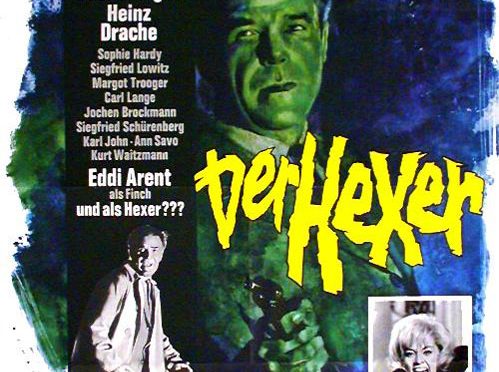
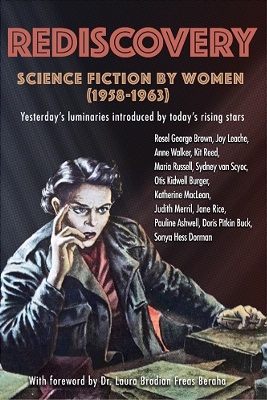

Der Hexer was tremendous fun. One hesitates to call it a classic, given its nature, but it certainly has the making of a film that will have a lot of fans and will probably be shown on television or revived in cinemas repeatedly. Really, the only thing missing is Klaus Kinski.
My relative at American International tells me that it's going to be called "The Mysterious Magician" in the US, possibly to distinguish it from the 1952 British version starring Herbert Lom. "The Witcher" makes an intriguing title, though. I bet somebody could do something interesting with that.
Yes, Klaus Kinski and Karin Dor instead of Sophie Hardy would have made the already great Hexer even greater. Though I'm not sure which role Kinski would play. Maybe a member of the villainous quartet of human traffickers, especially since two of them were rather forgettable.
"The Mysterious Magician" sounds like a movie about a stage magician, though I understand the need to distinguish this movie from the 1952 version, which I haven't seen. Of course, they could have gone with "The Gaunt Stranger", which was Wallace's original title. But while Rene Deltgen is many things, gaunt he is not.
I still think "The Witcher" is a great title. Maybe someone will use it one day, even if American International will not.